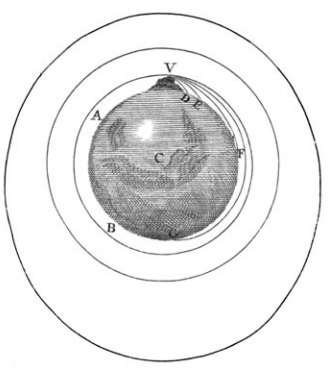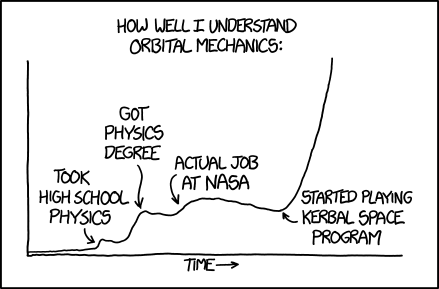Gravity and acceleration.
Discussion
"Weightless" is a misnomer really. They have weight, and are constantly falling to earth (ie, being accelerated towards it by gravity). It's just that, because they are also travelling forwards, they keep missing it.
Imagine someone at 100 miles high, with no forward speed. They'll fall straight down.
Give them 10mph forward speed, they'll fall down at an angle and land miles in front of where they started.
100mph, at an even greater angle, and land even further in front.
17500 mph, and they fall at such an angle that they miss the earth completely and carry on going around it. That's an orbit.
Their ship / spacestation is going at the same speed, hence relative to it, they appear to be floating. But all they're really doing is falling at the same speed as it.
Imagine someone at 100 miles high, with no forward speed. They'll fall straight down.
Give them 10mph forward speed, they'll fall down at an angle and land miles in front of where they started.
100mph, at an even greater angle, and land even further in front.
17500 mph, and they fall at such an angle that they miss the earth completely and carry on going around it. That's an orbit.
Their ship / spacestation is going at the same speed, hence relative to it, they appear to be floating. But all they're really doing is falling at the same speed as it.
What he said.
To add "accelerate" doesnt mean increase in speed it means change in velocity. Velocity is a vector and has speed and direction, so because the astronaut is orbiting the direction is constantly changing so they are constsntly accelerating. Their speed isnt constantly increasing though
To add "accelerate" doesnt mean increase in speed it means change in velocity. Velocity is a vector and has speed and direction, so because the astronaut is orbiting the direction is constantly changing so they are constsntly accelerating. Their speed isnt constantly increasing though
CrutyRammers said:
"Weightless" is a misnomer really. They have weight, and are constantly falling to earth (ie, being accelerated towards it by gravity). It's just that, because they are also travelling forwards, they keep missing it.
Imagine someone at 100 miles high, with no forward speed. They'll fall straight down.
Give them 10mph forward speed, they'll fall down at an angle and land miles in front of where they started.
100mph, at an even greater angle, and land even further in front.
17500 mph, and they fall at such an angle that they miss the earth completely and carry on going around it. That's an orbit.
Their ship / spacestation is going at the same speed, hence relative to it, they appear to be floating. But all they're really doing is falling at the same speed as it.
I like this. But think it deserves a diagram Imagine someone at 100 miles high, with no forward speed. They'll fall straight down.
Give them 10mph forward speed, they'll fall down at an angle and land miles in front of where they started.
100mph, at an even greater angle, and land even further in front.
17500 mph, and they fall at such an angle that they miss the earth completely and carry on going around it. That's an orbit.
Their ship / spacestation is going at the same speed, hence relative to it, they appear to be floating. But all they're really doing is falling at the same speed as it.

they arent weightless, they are falling constantly. They are actually falling as fast as they are travellng around the globe. The acceleration they are subject to is centrepetal (centre seeking), and when this force is equal to the force of gravity, they are in constant freefall but because of their height and speed, always keep falling past the horizon. Not having equation editor on here I cant post the formula. At a flight altitude of 250miles, they need a flight speed of around 17500mph to maintain constant freefall.
HaiKarate said:
Are equivalent and involve a force, correct?
A scientist stated that astronauts float due to them continually accelerating around the Earth.
Considering they are weightless, how can they be accelerating?
No.A scientist stated that astronauts float due to them continually accelerating around the Earth.
Considering they are weightless, how can they be accelerating?
Yes
No.
Float? Got a lilo up there? In the shape of a crocodile?
Ask a photon with zero mass how it decelerates.
To answer your headline
Gravity and Acceleration
Yes, see Newton and then Einstein. Then PH

Edited by Gandahar on Saturday 7th April 00:07
keirik said:
What he said.
To add "accelerate" doesnt mean increase in speed it means change in velocity. Velocity is a vector and has speed and direction, so because the astronaut is orbiting the direction is constantly changing so they are constsntly accelerating. Their speed isnt constantly increasing though
I like this explanation. Makes sense. Kinda.To add "accelerate" doesnt mean increase in speed it means change in velocity. Velocity is a vector and has speed and direction, so because the astronaut is orbiting the direction is constantly changing so they are constsntly accelerating. Their speed isnt constantly increasing though
But. According to Einstein they are indeed weightless. There is no experiment that they can conduct in the spaceship to confirm their weight as the measuring equipment is (scales) accelerating at the same rate.
Edited by HaiKarate on Saturday 7th April 20:55
CrutyRammers said:
"Weightless" is a misnomer really. They have weight, and are constantly falling to earth (ie, being accelerated towards it by gravity). It's just that, because they are also travelling forwards, they keep missing it.
Imagine someone at 100 miles high, with no forward speed. They'll fall straight down.
Give them 10mph forward speed, they'll fall down at an angle and land miles in front of where they started.
100mph, at an even greater angle, and land even further in front.
17500 mph, and they fall at such an angle that they miss the earth completely and carry on going around it. That's an orbit.
Their ship / spacestation is going at the same speed, hence relative to it, they appear to be floating. But all they're really doing is falling at the same speed as it.
Thanks. Thats a useful explanation. Imagine someone at 100 miles high, with no forward speed. They'll fall straight down.
Give them 10mph forward speed, they'll fall down at an angle and land miles in front of where they started.
100mph, at an even greater angle, and land even further in front.
17500 mph, and they fall at such an angle that they miss the earth completely and carry on going around it. That's an orbit.
Their ship / spacestation is going at the same speed, hence relative to it, they appear to be floating. But all they're really doing is falling at the same speed as it.

DanL said:
Free fall has a body experiencing a force, or it doesn’t accelerate thanks to Newton’s first law. 
When you step off a building (with a parachute, of course) there is no longer a force acting upon you, you are weightless. So you are wrong. It is as if you were floating in space. The two are indistinguishable. 
So no answer as of yet that makes sense.
HaiKarate said:
When you step off a building (with a parachute, of course) there is no longer a force acting upon you, you are weightless. So you are wrong. It is as if you were floating in space. The two are indistinguishable.
So no answer as of yet that makes sense.
If you step off a building you have a gravitational force acting on you, which is what causes you to accelerate downwards. So no answer as of yet that makes sense.
Force due to gravity = Gravitational constant * mass1 * mass2 / distance^2
In orbit you still have the force acting on you, albeit a bit smaller because of the distance, but it's just that you're going sideways fast enough that you miss landing on the ground.
HaiKarate said:
DanL said:
Free fall has a body experiencing a force, or it doesn’t accelerate thanks to Newton’s first law. 
When you step off a building (with a parachute, of course) there is no longer a force acting upon you, you are weightless. So you are wrong. It is as if you were floating in space. The two are indistinguishable. 
So no answer as of yet that makes sense.
 If you step off a building with a parachute, there are two main forces acting on you that come to mind - gravity pulling you downwards, and the force from the parachute vs. air which resists this pull to slow your decent.
If you step off a building with a parachute, there are two main forces acting on you that come to mind - gravity pulling you downwards, and the force from the parachute vs. air which resists this pull to slow your decent.The BBC has a nice page explaining this.
This is pre-GCSE physics really...
HaiKarate said:
Acceleration is due to a force
freefall is also an acceleration but has no force
What’s the difference??
The free falling astronauts either have the force of gravity to contend with, which accelerates them either by increasing their speed until they hit the ground, or by curving their path so they stay in orbit.freefall is also an acceleration but has no force
What’s the difference??
If the earth wasn't exerting a force (and nothing else was either) they would continue in a straight line at a steady speed. Velocity would be constant, no acceleration because no force.
HaiKarate said:
When you step off a building (with a parachute, of course) there is no longer a force acting upon you, you are weightless. So you are wrong. It is as if you were floating in space. The two are indistinguishable.
So no answer as of yet that makes sense.
Do that parachute jump with the harness attached to your balls, and tell me how weightless you are.So no answer as of yet that makes sense.
Gassing Station | Science! | Top of Page | What's New | My Stuff





